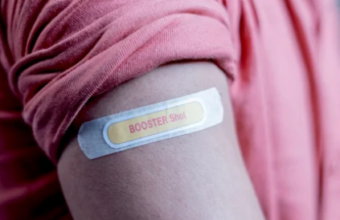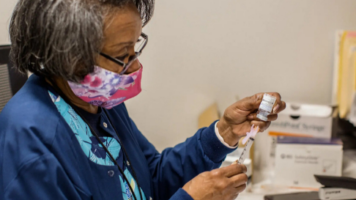COVID-19 News
COVID-19 Update | April 14, 2023
April 14, 2023

COVID-19 Update | April 14, 2023
The California Biotechnology Foundation is committed to keeping you up to date about COVID-19 testing, treatment and prevention advancements. The following resources track what progress has been made as of April 14, 2023. Notable advancements include:
- InflaRx’s new antibody drug has received emergency use authorization from the U.S. FDA to treat critically ill COVID-19 patients.
- According to a new study in the Journal of Clinical Investigation, researchers have identified an antibody treatment that appears to block infection by all dominant variants of the virus that causes COVID-19.
Recent News
- How Often Should People Get COVID-19 Boosters?
Scientific American – April 13, 2023
Many people in the U.S. who are fully vaccinated and boosted for COVID-19 have been waiting—eagerly in some cases—to receive another layer of protection as they pass the six-month mark after their last booster in fall 2022. But most will have to continue to wait. Late last month the Centers for Disease Control and Prevention upheld its existing COVID-19 vaccination recommendations: the agency says that just one dose of the latest updated booster, often called the bivalent booster, is necessary for now. The Food and Drug Administration has also only authorized the same one-dose booster. - COVID-19: $5 billion investment for new vaccines and treatment
CBS News – April 13, 2023
The U.S. Department of Health and Human Services is looking to the future of COVID-19 as the country enters a new phase in the pandemic. A senior administration official says DHS is launching a $5 billion investment to help develop new types of vaccines and treatments. It’s called Project NextGen. The government is looking to get ahead of the rapidly-evolving coronavirus. Researchers hope the next generation of vaccines can shut down the infection before it ever gets the chance to make anyone sick. - FDA Authorizes New Antibody Treatment For Severe COVID-1
Forbes – April 12, 2023
A new antibody drug by pharmaceutical company inflaRx received FDA emergency use authorization to treat critically ill COVID-19 patients. One of the greatest hurdles for monoclonal antibody development during the COVID-19 pandemic is the ongoing mutation of the virus. Most antibodies introduced throughout the pandemic targeted the virus spike protein, which mutates significantly with every emerging variant. The monoclonal antibody, vilobelimab, does not target the spike protein, nor the virus. Rather, it targets a specific product of the complement system; an immune response that triggers most of the severe symptoms we experience when battling a dangerous pathogen, including inflammation, pain, fatigue, etc. - WHO Warns of a New and Highly Contagious COVID-19 Subvariant
Everyday Health – April 12, 2023
The World Health Organization (WHO) is keeping tabs on the new omicron subvariant XBB.1.16, dubbed “Arcturus” by those tracking the virus. XBB.1.16 is currently fueling a surge of cases in India, where it’s the dominant subvariant, and has been identified in at least 22 countries, including the United States. XBB.1.16 is “one to watch,” according to Maria Van Kerkhove, PhD, COVID-19 technical lead at WHO and a professor at the Georgetown University Center for Global Health Science and Security in Washington, DC. - Hospitals Intensify Efforts to Treat Long COVID-19 in Kids and Teens
U.S. News – April 11, 2023
COVID-19, a puzzling virus in itself, has continued to vex doctors and patients with its sometimes serious, debilitating aftereffects. These persistent symptoms, labeled long COVID-19 and affecting every demographic, are proving particularly worrying as the effects on children and teens are increasingly being recognized. Estimates suggest that between 4% and 25% of kids who get COVID-19 develop long COVID-19, said Dr. S. Kristen Sexson Tejtel, director of the COVID-19 Return to Activity Clinic and of preventive cardiology at Texas Children’s Hospital in Houston. There is no lab test to precisely diagnose the condition, which makes it hard to pin down, noted Tejtel, who is also an associate professor of pediatric cardiology at the Baylor College of Medicine. - Antibody targets omicron and other COVID-19 variants
Cornell Chronicle – April 10, 2023
A team led by researchers at Weill Cornell Medicine, the University of Wisconsin-Madison, Scripps Research and the University of Chicago has identified an antibody that appears to block infection by all dominant variants of the virus that causes COVID-19, including omicron, the most recent. In a study published March 6 in the Journal of Clinical Investigation, senior author Patrick Wilson, the Anne E. Dyson Professor of Pediatric Research and a member of the Gale and Ira Drukier Institute for Children’s Health at Weill Cornell Medicine, and his colleagues tested antibodies derived from patient blood samples against successive versions of the virus that emerged during the pandemic. One of these proteins, dubbed S728-1157, proved highly effective at neutralizing not only older variants but also seven subtypes of omicron. - WHO and SAGE update COVID-19 vaccine guidance
International Travel & Health Insurance Conferences – April 10, 2023
The World Health Organization (WHO) has recently revised its vaccine guidance after meeting with its Strategic Advisory Group of Experts on Immunization (SAGE). SAGE no longer recommends annual COVID-19 vaccine boosters for healthy adults under 60 after they have received both a primary vaccine series and booster. Additionally, it does not recommend vaccinating healthy children aged six months and 17 years against COVID-19 at all. The Centers for Disease Control and Prevention (CDC) and other national health agencies are issuing similar updates. - How Do We Define Long COVID-19?
Contagion Live – April 10, 2023
It’s a story that is becoming all too common: experiencing persistent symptoms after recovering from acute COVID-19 infection. Serious and even debilitating symptoms, such as fatigue and shortness of breath, have become infamous identifiers of post–COVID-19 condition, often called “long COVID-19.” However, there is still no ubiquitous definition of long COVID-19. The United Kingdom National Institute for Health and Care Excellence (NICE), the World Health Organization (WHO), and the US Centers for Disease Control and Prevention (CDC) have all published definitions of post–COVID-19 condition, and there are discrepancies between their respective definitions. - A silver lining’: how COVID-19 ushered in a vaccines golden era
The Guardian – April 7, 2023
The COVID-19 pandemic has been awful for many reasons. But if there is a bright side to the past three years, it is vaccines. Development and testing has advanced at an unprecedented pace since the arrival of COVID-19, enabling technologies that might otherwise have taken another decade to undergo late-stage clinical testing, regulatory approval and manufacturing scale-up to prove their mettle in millions of people. These advances have set the stage for further breakthroughs in the next five to 10 years that could help to combat some of the greatest scourges of humanity, from common respiratory infections to cancer. - CDC: Omicron Subvariant XBB.1.5 Responsible for 88% of New COVID-19 Infections
U.S. News – April 7, 2023
Omicron subvariant XBB.1.5 is driving the vast majority of new COVID-19 cases in the U.S. but shows signs of declining, according to data from the Centers for Disease Control and Prevention. XBB.1.5 was responsible for 88% of new infections this week, according to CDC estimates. The subvariant plateaued in recent weeks and declined 1 percentage point from the previous week. - FDA Chief on the Future of COVID-19
Med Page Today – April 6, 2023
Jeremy Faust, MD, editor-in-chief of MedPage Today, and Robert Califf, MD, commissioner of the FDA, discuss the end of the U.S. public health emergency and what it will mean for COVID-19 care moving forward. Their conversation covers the continued use of boosters for the immunocompromised and elderly, the mechanisms of emergency use authorization (EUA), and creating equitable technology.
Rely on California Biotechnology Foundation to monitor breaking news and provide updates on the latest advancements in COVID-19 diagnostics, vaccines and treatments.
Stay informed on the latest news and trends on the economic and health benefits of this industry by visiting the new CABiotech.org
If you have any questions about hosting informational briefings for your colleagues serving in the legislature, contact California Biotechnology Foundation Executive Director Patty Cooper at (916)764-2434 or [email protected].


